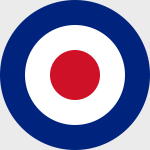Hobby Master HA8325 RAF Supermarine Spitfire Mk. IXc Fighter - MK694, Flight Leftenant Jaroslav Dobrovolny, No.313 (Czech) Squadron, RAF North Weald, England, October 1944 (1:48 Scale) "My Spitfire was in a mess. Cannon shells had blasted a couple of large holes in the side. One had burst against the radio and armour behind my seat. Another, having made a hole the size of a football, had torn the control wires to shreds. The elevator was hanging by one thread of frayed wire and my rigger neatly snapped this with a sharp blow from his fingers. "You will not be needing that any more," he grinned at me. "It all looks very untidy - doesn't it?" Another cannon shell had torn big pieces out of the elevator and rudder surfaces."
- Group Captain W. Duncan-Smith
 The Spitfire is the most famous British aircraft of all time. Although less numerous than the Hawker Hurricane, it is remembered as the sleek, thoroughbred fighting machine that turned the tide during the Battle of Britain. The Spitfire was among the fastest and most maneuverable prop-driven fighters of World War II, serving in virtually every combat theater.
The Spitfire is the most famous British aircraft of all time. Although less numerous than the Hawker Hurricane, it is remembered as the sleek, thoroughbred fighting machine that turned the tide during the Battle of Britain. The Spitfire was among the fastest and most maneuverable prop-driven fighters of World War II, serving in virtually every combat theater.
Supermarine designer Reginald Mitchell created this small, graceful, elliptical-wing fighter with eight guns in the wings that were able to fire without being hindered by the propeller. The immortal Spitfire thus became not merely one of the best-performing fighters of all time, but also one of the best-looking. Although never employed as a long-range escort, the Spitfire was a champion in an air-to-air duel. Spitfires routinely dived at the speed of sound, faster than any of the German jets.
A carrier-based version, called the Seafire, was a winner in its own right, serving valiantly on convoy routes during World War II. The Seafire 47 was even used in the early stages of the Korean War, before it was replaced by more modern jet aircraft.
Pictured here is a 1:48 scale replica of a RAF Supermarine Spitfire Mk. IXc fighter that was piloted by Flight Leftenant Jaroslav Dobrovolny, who was attached to No.313 (Czech) Squadron, then deployed to RAF North Weald, England, during October 1944. Sold Out!
Dimensions:
Wingspan: 9-inches
Length: 7-1/2-inches
Release Date: June 2023
Historical Account: "Czech Mates" - The squadron was formed at RAF Catterick on May 10th, 1941. It was the last RAF squadron to be formed mostly of escaped Czechoslovak pilots. Its first commander was the British Squadron Leader Gordon Sinclair. On July 29th, Czechoslovak fighter pilot Josef Jaske was appointed as joint commander of the squadron. The plan was for responsibility to be transferred gradually from Sinclair to Jaske.
The squadron was equipped initially with Supermarine Spitfire I fighters. On June 30th, 1941, it moved to RAF Leconfield in the East Riding of Yorkshire. In August, the squadron was re-equipped with the Spitfire IIA, and on August 25th it moved to RAF Portreath in Cornwall. In October, the squadron was re-equipped with the Spitfire VB/C.
On December 15th, 1941, Sqn Ldr Karel Mrazek succeeded Jaske as commanding officer and the squadron moved to RAF Hornchurch in Essex. On June 8th, 1942, the squadron moved to RAF Church Stanton in Somerset and on June 26th Sqn Ldr Jaroslav Himr succeeded Mrazek as commanding officer.


